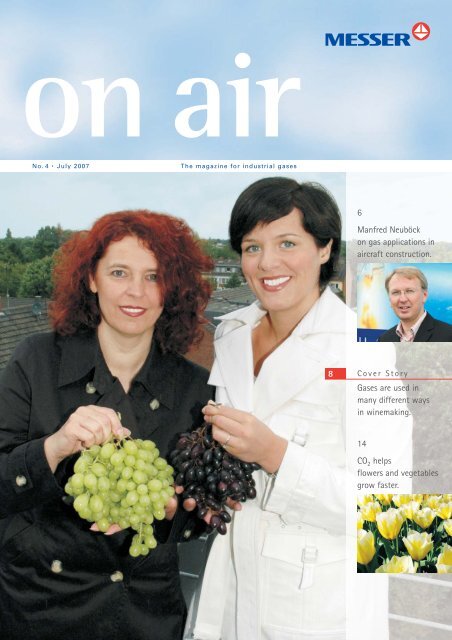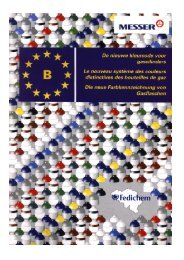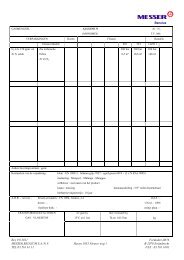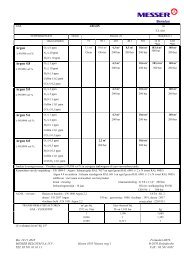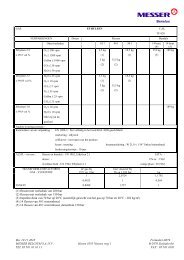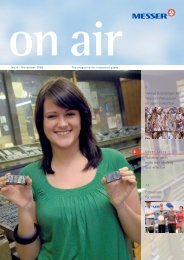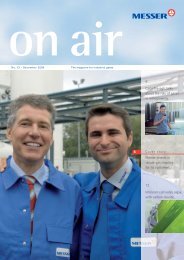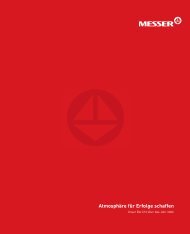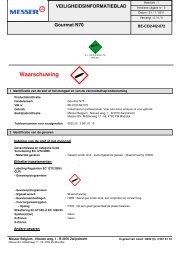No. 4 / July 2007 - Messer
No. 4 / July 2007 - Messer
No. 4 / July 2007 - Messer
Create successful ePaper yourself
Turn your PDF publications into a flip-book with our unique Google optimized e-Paper software.
on air<br />
<strong>No</strong>. 4 · <strong>July</strong> <strong>2007</strong> The magazine for industrial gases<br />
8<br />
6<br />
Manfred Neuböck<br />
on gas applications in<br />
aircraft construction.<br />
Cover Story<br />
Gases are used in<br />
many different ways<br />
in winemaking.<br />
14<br />
CO 2 helps<br />
flowers and vegetables<br />
grow faster.
2 : Contents<br />
Editorial : 3<br />
News : 4-5<br />
Interview : 6-7<br />
“Nitrogen on tap”<br />
Manfred Neuböck, the Chief Technology<br />
Officer of FACC, on gas applications in aircraft<br />
construction and working with <strong>Messer</strong>.<br />
<strong>Messer</strong> World : 12-13<br />
Everything to do with CO2 <strong>Messer</strong> acquires the CO2 specialist<br />
Asco in Switzerland.<br />
E<br />
The allure of growing markets<br />
Peru’s economy is booming.<br />
Gas-o-theque : 14<br />
An advantage ripe for the picking<br />
Growing plants and vegetables cheaply and<br />
easily with carbon dioxide.<br />
Gasette : 15<br />
Tips, dates, things to know<br />
Cover Story : 8-11<br />
Gas – the good spirit of wine<br />
There is a growing interest in gas applications in today’s wine<br />
technology. Wine growers can use gases in the different stages of<br />
winemaking. An overview.<br />
Marlen Schäfer from the Corporate Office at <strong>Messer</strong> (left) and<br />
Anita Kötél from <strong>Messer</strong> Hungarogáz with the precious raw material<br />
from which wine-growers make fine wine. Gases from <strong>Messer</strong> help<br />
ensure perfect wine enjoyment.<br />
Engine cowl at FACC<br />
Stefan <strong>Messer</strong> (l.) and Thomas Trachsel<br />
CO 2 promotes tomato growth.<br />
Imprint<br />
Published by:<br />
<strong>Messer</strong> Group GmbH<br />
Corporate Communications<br />
Otto-Volger-Straße 3c<br />
D–65843 Sulzbach<br />
Germany<br />
Editorial Team:<br />
Diana Buss – Editor-in-chief<br />
Tel.: +49 6196 7760-361<br />
diana.buss@messergroup.com<br />
Benjamin Auweiler, Thomas<br />
Böckler, Marc Dierckx,<br />
Dr. Christoph Erdmann, Michael<br />
Holy, Anita Kötél, Monika<br />
Lammertz, Joachim Rohovec,<br />
Marlen Schäfer<br />
Concept and Realization:<br />
Maenken Kommunikation GmbH<br />
Von-der-Wettern-Straße 25<br />
D–51149 Cologne<br />
Germany<br />
Translation:<br />
Context GmbH<br />
Elisenstraße 4–10<br />
D–50667 Cologne<br />
Germany<br />
Photo credits:<br />
Coca-Cola GmbH; FACC<br />
Many thanks to<br />
all the contributors!<br />
Go to www.messergroup.com<br />
for comprehensive information<br />
about on air, as well as the<br />
contact details of the editorial<br />
team.<br />
on air is published four times<br />
a year in German, English and<br />
Hungarian.<br />
on air 04 · <strong>2007</strong>
The editorial team<br />
Editor-in-chief:<br />
Diana<br />
Buss<br />
Corporate Office:<br />
Benjamin<br />
Auweiler<br />
on air 04 · <strong>2007</strong><br />
Marlen<br />
Schäfer<br />
Application Technology:<br />
Thomas<br />
Böckler<br />
Monika<br />
Lammertz<br />
Production & Engineering:<br />
Dr. Christoph<br />
Erdmann<br />
Western Europe region:<br />
Marc<br />
Dierckx<br />
Central Europe region:<br />
Michael<br />
Holy<br />
Southeastern Europe region:<br />
Anita<br />
Kötél<br />
Joachim<br />
Rohovec<br />
Dear Readers,<br />
Editorial : 3<br />
Wine connoisseurs are used to testing<br />
and judging the appearance, bouquet<br />
and flavor of wines. Meanwhile, the<br />
wine growers rely on their know-how<br />
and a little luck to ensure that their<br />
product is of the best possible quality.<br />
Gases can have a positive effect on quality<br />
at every stage between harvesting<br />
and bottling, and can give the wine its<br />
special character. In this issue of on air,<br />
you can read about wine treatment<br />
from the grape to the “invisible cork”.<br />
A smooth gas supply is absolutely<br />
vital, and this is certainly the case at Stefan <strong>Messer</strong><br />
FACC, a global supplier to the aerospace<br />
industry. In an interview with on air, Manfred Neuböck, the Chief Technology Officer<br />
of FACC, describes it as having “nitrogen on tap”. The Austrian company uses the<br />
inert properties of nitrogen to ensure safe manufacturing processes, and has decided<br />
in favor of installing nitrogen generators at its own premises.<br />
on air shows you the diversity of applications with industrial gases worldwide:<br />
in Polish steelworks, French canteens, Swiss warehouses, Romanian soft drinks,<br />
Croatian glass furnaces, Peruvian mining trucks or Belgian greenhouses. Huge benefits<br />
are “ripe for the picking” as a result of the natural fertilization of flowers and<br />
vegetables with pure carbon dioxide. This saves energy and costs, and the CO2 is<br />
completely absorbed by the plants.<br />
I hope you enjoy reading this issue of on air!<br />
Best Regards,<br />
Stefan <strong>Messer</strong>
4 : News<br />
Gormet also uses liquid argon and liquid carbon<br />
dioxide in its production processes.<br />
Rapid success with customer<br />
Speed can be a decisive factor. The willingness of<br />
<strong>Messer</strong> in Romania to make decisions at short notice<br />
has convinced Gormet, the Romanian subsidiary of the<br />
German company IEV, to enter into a long-term partnership.<br />
The metalworking company in Cluj needs the<br />
liquid gases argon, oxygen and carbon dioxide as well<br />
as acetylene in its production processes; and <strong>Messer</strong><br />
was able to help out at short notice.<br />
Florentin Bombita, <strong>Messer</strong> Romania Gaz<br />
Reliable fire prevention<br />
Extinguishing fires with water usually causes a lot of damage to stock.<br />
In 2004, Emmi Frischprodukte from Ostermundigen in Switzerland decided that<br />
it would rather prevent fires than extinguish them. This is achieved by reducing<br />
the oxygen content in the warehouse from 21 to 13 to 17 per cent through the<br />
controlled addition of nitrogen into the air. In this atmosphere, it is practically<br />
impossible for a fire to start. The conditions<br />
in the warehouse are then similar to those<br />
encountered at an altitude of 3,000 meters.<br />
It is therefore safe for people to enter the<br />
warehouse. <strong>Messer</strong> has so far installed another<br />
six fire prevention systems in Switzerland.<br />
Robert Schlatter, <strong>Messer</strong> Schweiz<br />
Substantial damage can<br />
be avoided by preventing<br />
fires in warehouses instead<br />
of extinguishing them.<br />
All works supplied<br />
In the Huta Sendzimira works of Mittal Steel in the Polish city of Krakow,<br />
nitrogen has been used for heat treatment since the beginning of May – another<br />
milestone in a dynamic collaboration. Mittal Steel is by far the biggest steel<br />
producer in Poland. <strong>Messer</strong> has been supplying the Huta Cedler plant with liquid<br />
nitrogen and hydrogen for six years,<br />
while the Huta Sendzimira steel plant<br />
has been receiving cylinder gases since<br />
2005. At the beginning of 2006, both<br />
sides expanded this collaboration<br />
significantly: <strong>Messer</strong> has since been<br />
supplying gas to all the Polish steel<br />
plants of Mittal Steel.<br />
Danuta Dzierzak, <strong>Messer</strong> Polska<br />
<strong>Messer</strong> supplies gas to all the<br />
plants of Mittal Steel, Poland’s<br />
largest steel producer.<br />
Perfect for precooked meals<br />
Staff restaurants, hospitals and school canteens<br />
are benefiting from the new Snowline technology,<br />
a joint development by <strong>Messer</strong> and its partner<br />
Electrocalorique. Centrally prepared meals are<br />
chilled in special carts during transportation to<br />
the consumer and later heated automatically.<br />
An integrated computer system regulates the<br />
temperature through the injection of dry ice snow.<br />
The heating element is only activated shortly<br />
before consumption, thus ensuring that the fresh<br />
part of the meal is cool while the cooked part is<br />
served hot.<br />
Marc Dierckx, <strong>Messer</strong> France<br />
The Snowline technology<br />
ensures that different<br />
foods are kept<br />
at the right temperature.<br />
on air 04 · <strong>2007</strong>
The pharmaceutical industry not only uses<br />
nitrogen for inerting but also for reducing solventcontaminated<br />
waste gas.<br />
Pharmaceutical manufacturer<br />
protects the environment<br />
The most important Hungarian pharmaceutical<br />
manufacturer, Richter Gedeon, uses solvents in the<br />
production of pharmaceutical products and chemical<br />
materials, as well as nitrogen for inerting. Richter<br />
wanted to reduce the solvent-contaminated waste<br />
gas for the sake of the environment. Successful tests<br />
with DuoCondex have shown that emissions can<br />
be reduced by cooling the condensers with liquid<br />
nitrogen. The solvents that are condensed out are<br />
collected in the DuoCondex plant and either recycled<br />
or disposed of in a special furnace.<br />
Anita Kötél, <strong>Messer</strong> Hungarogáz<br />
Oxyfuel technology heats glass furnace<br />
on air 04 · <strong>2007</strong><br />
Sparkling carbonic acid for Coca-Cola<br />
A major step forward has been taken<br />
in the fiercely competitive Romanian<br />
beverage market. Since March, the<br />
soft drinks producer Coca-Cola has<br />
been procuring its carbon dioxide from<br />
<strong>Messer</strong> in Romania. Key to this success<br />
was our excellent relationship<br />
The glass manufacturer Vetropack in Croatia was looking for an efficient<br />
heating alternative while repairs were being carried out on its glass furnace flue.<br />
The solution came in the shape of an oxygen burner and Oxyfuel technology.<br />
<strong>Messer</strong> supplied and installed all the hardware for this project and kept the plant<br />
supplied for 40 days with a total of 2.1 million cubic meters of liquid oxygen.<br />
Miljenka Debeljak, <strong>Messer</strong> Croatia Plin<br />
Photo: Coca-Cola GmbH<br />
Installation of hardware<br />
at the glass-packaging<br />
manufacturer Vetropack.<br />
<strong>Messer</strong> is the largest gas<br />
producer and supplier in<br />
Croatia, employing<br />
around 250 people at<br />
seven locations.<br />
News : 5<br />
Youngest subsidiary in China<br />
The youngest of <strong>Messer</strong>’s 15 subsidiaries in China,<br />
Zhangjiagang <strong>Messer</strong> (ZhMG), celebrated the official<br />
opening of its air separator in the Zhangjiagang<br />
Chemical Park. ZhMG also produces hydrogen in the<br />
industrial park, which is located 150 kilometers to the<br />
north west of Shanghai.<br />
As part of the ceremony, ZhMG donated motorized<br />
bicycles to the Zhangjiagang child welfare service in<br />
order to make the long journey to school easier for five<br />
pupils with slight disabilities. The donation was accepted<br />
by Gu Huijuan, president of the child welfare service.<br />
Yolanda Zhou, <strong>Messer</strong> China<br />
with Coca-Cola in Serbia. Until the<br />
transport capacity for liquid CO2 has<br />
been expanded in Romania, deliveries<br />
will be carried out by the Serbian<br />
company.<br />
Paula Sterian, <strong>Messer</strong> Romania Gaz<br />
An advertisement from<br />
1954 still works today.<br />
Five motorized bicycles were donated to children with<br />
slight disabilities in order to make their long journey<br />
to school easier.
6 : Interview<br />
“Nitrogen on tap”<br />
Lightweight construction with fiber composites is a mega-trend in<br />
the aerospace industry. Composites already account for up to 50 per cent of<br />
the structure of the Airbus A 380 and Boeing 787. FACC is benefiting from this.<br />
on air spoke to the Chief Technology Officer of FACC, Manfred Neuböck, about<br />
the project, <strong>Messer</strong>’s nitrogen generators and new gas applications.<br />
on air: What role does nitrogen play in the production<br />
of fiber composite components?<br />
Manfred Neuböck: With our products, it is important<br />
to produce precisely molded parts – for example<br />
the engine cowling – that are as lightweight as<br />
possible but robust at the same time. All the parts<br />
produced in our factories are hardened in gas-tight<br />
pressure vessels. These so-called autoclaves are<br />
inerted with nitrogen for quality assurance and fire<br />
safety reasons.<br />
on air: What are the advantages of the new nitrogen<br />
generator?<br />
Manfred Neuböck: The supply from on-site nitrogen<br />
generators is considerably cheaper than having liquid<br />
nitrogen delivered by tanker. Even nitrogen with a<br />
purity of 96 per cent is optimal for us. That is why we<br />
Photo: FACC<br />
have now installed the third of these units.<br />
on air: What was the key factor in your decision?<br />
Manfred Neuböck: <strong>Messer</strong> were very committed<br />
and thorough in dealing with the brief set out in our<br />
tender specifications. And that is why they were able<br />
to provide such an optimally designed solution for<br />
the supply of nitrogen. That is what convinced us.<br />
on air: What stood out for you in the project’s implementation?<br />
Manfred Neuböck: We were amazed at the comprehensive<br />
prefabrication of all of the nitrogen generator’s<br />
components. <strong>No</strong>t just the process equipment,<br />
but also the container with the compressor, process<br />
management system and analyzers were delivered<br />
complete and ready for start-up. The start-up team<br />
proved to be extremely flexible, even when faced with<br />
Worldwide clientele<br />
Fischer Advanced Composite Components AG (FACC), which<br />
was founded in 1989, is a globally operating company specializing<br />
in the development and production of fiber composite<br />
components for the aerospace industry. At its four production<br />
plants in Upper Austria, FACC produces, among other<br />
things, structural components and systems for the fuselages<br />
and tail units, engine cowlings as well as the interiors of commercial<br />
aircraft. With 1,282 employees, the company generated<br />
a turnover of 182.5 million euros in the last financial year.<br />
FACC exports nearly 100 per cent of the lightweight structural<br />
components it produces. It numbers among others the<br />
large aircraft manufacturers Airbus, Boeing and Bombardier<br />
among its worldwide clientele.<br />
FACC employees fitting an engine cowling.<br />
on air 04 · <strong>2007</strong>
special requirements, such as the change to the piping<br />
layout and the positioning of the heater.<br />
on air: Were your operational procedures adversely<br />
affected?<br />
Manfred Neuböck: <strong>No</strong>. Deliveries were made in normal<br />
trucks and we were notified of the deliveries in good<br />
time. <strong>Messer</strong> managed well with the storage area that<br />
had been designated beforehand. The integration into<br />
our nitrogen network and operating resources supply<br />
system was completed by our people as part of their<br />
normal daily schedule.<br />
on air: How is control and maintenance of the plant<br />
organized?<br />
Manfred Neuböck: Very professionally. We now have<br />
nitrogen virtually “on tap”. Our Facility Manager,<br />
Christoph Jell only has to organize a daily ten-minute<br />
on air 04 · <strong>2007</strong><br />
At four factories<br />
in Upper Austria, FACC<br />
manufactures, among<br />
other things, structural<br />
components and interiors<br />
for commercial aircraft.<br />
Christopher Jell (l.)<br />
and Walter Bergauer (r.)<br />
starting up the new nitrogen<br />
generator.<br />
The Chief Technology<br />
Officer of FACC, Manfred<br />
Neuböck (r.), answers<br />
Uwe Rosenow’s questions:<br />
“<strong>Messer</strong> were able to provide<br />
an optimally designed<br />
plant solution.”<br />
inspection round. The plant is continuously monitored<br />
by <strong>Messer</strong> via a remote control system. The on-site<br />
maintenance team from <strong>Messer</strong> in Austria checks our<br />
plant at regular intervals.<br />
on air: Given all these positive experiences, would you<br />
consider purchasing any other products from <strong>Messer</strong>?<br />
Manfred Neuböck: On the basis of our solid working<br />
relationship, we have transferred the supply of all<br />
welding and test gases required by us to <strong>Messer</strong>. And<br />
we also use dry ice blasting machines for cleaning the<br />
molds. <strong>Messer</strong> supplies the CO2 for this. The excellent<br />
growth prospects in our markets will further boost the<br />
potential for gas applications. We therefore look forward<br />
to developing our partnership in the future.<br />
Interview: Uwe Rosenow, <strong>Messer</strong> Austria<br />
Interview : 7<br />
YOUR CONTACT PERSON:<br />
Dr. Christoph Erdmann<br />
Head of Sales On Site Europe<br />
<strong>Messer</strong> Group GmbH<br />
Tel.: +49 (0) 6196 7760-155<br />
christoph.erdmann@messergroup.com<br />
Languages:<br />
Photo: FACC
8 : Cover Story<br />
Wine cellar in Hungary:<br />
gases give more freshness<br />
Gas – the good spirit of wine<br />
Wines with a fresh, fruity character are in high demand these<br />
days. Essential to their production are quick and careful wine<br />
preparation, must purification, controlled fermentation<br />
and oxidation, as well as thorough hygiene. One<br />
noticeable development in the wine technology<br />
of today is the growing interest in gas applications.<br />
on air 04 · <strong>2007</strong>
The use and combination of gases depends on the<br />
character of the wine and the expectations of the consumers.<br />
Carbon dioxide is particularly suitable for the<br />
treatment of rosé and white wines. For red wines, on<br />
the other hand, nitrogen is used to a greater extent.<br />
The gases that are used in the treatment of wine can<br />
be divided into two groups. The first group includes<br />
inert gases such as nitrogen and argon. They do not<br />
react with the individual components of the wine. The<br />
second includes gases such as oxygen and carbon<br />
dioxide, which influence the character of the wine.<br />
Nitrogen and carbon dioxide are used in winery<br />
management. Both gases are used separately as well as<br />
in combination with each other. Carbon dioxide, however,<br />
dissolves much more readily in liquids than nitrogen.<br />
Wine growers can use gases in the various stages<br />
of wine production – from the grape harvest through<br />
to improving the shelf life. Here is an overview:<br />
Grape harvest<br />
If temperatures during the grape harvest are over<br />
25 degrees Celsius, there is the danger that the grapes<br />
will start to ferment prematurely. Here, the use of carbon<br />
dioxide snow offers the ideal solution for cooling<br />
the grapes. The advantage of this method compared<br />
with normal ice cooling is that there is no water formation<br />
when carbon dioxide snow melts.<br />
on air 04 · <strong>2007</strong><br />
Wine processing<br />
The removal of the atmospheric oxygen from the must<br />
provides microbiological protection against oxidation<br />
and prevents premature fermentation. This is done by<br />
either putting dry ice pellets directly into the press or<br />
adding them to the prepared must.<br />
Cold maceration<br />
The technology of cold maceration facilitates an<br />
enhanced extraction of fruit aromas. With this process,<br />
the wine growers prolong fermentation through low<br />
must temperatures. In order to prevent oxidation, they<br />
treat the ripe, healthy grapes with carbon dioxide prior<br />
to processing.<br />
Must purification<br />
Flotation technology is one of the most modern<br />
methods of must purification. During this process,<br />
the must is continuously filtered before being<br />
mixed with nitrogen or carbon dioxide in a pressureresistant<br />
container. Finally, the must is exposed to<br />
atmospheric pressure. This pressure causes the clear<br />
liquid to be separated from the suspended solids.<br />
Storage<br />
The inerting of tanks – the removal of atmospheric<br />
oxygen from the liquid – provides protection against<br />
Cover Story : 9<br />
At one of our customers, PVS Pavelka in Slovakia, treatment with dry ice snow prevents premature fermentation of the grapes.<br />
The company can look back on many generations of family tradition. Gases from <strong>Messer</strong> play a role in the success of the winery.<br />
continued on page 10
10 : Cover Story<br />
Source:<br />
Hungarian article in trade journal.<br />
György, Dr. Lo“rinc, Ákosné,<br />
Dr. Nagy – Miklós, Dr. Kállay:<br />
Védo“gázok a borászatban,<br />
Borászati Füzetek 1997/4 sz.<br />
Wine growers in Tokaj, Hungary’s top wine-growing region, also use gas mixtures such as<br />
carbon dioxide and nitrogen.<br />
oxidation. Carbon dioxide in the form of gas or snow is<br />
used for white wine. Nitrogen or a mixture of nitrogen<br />
and argon is used in red wine tanks.<br />
Freshening<br />
Wine growers use carbon dioxide to freshen the wine.<br />
This creates a fresher taste and fruitier aroma.<br />
Homogenization<br />
Carbon dioxide is used for the effective mixing of different<br />
vintages or types of wine. This prevents oxidation<br />
of the different wines.<br />
Bottling and gastronomy<br />
A special gas mixture also offers oxidation protection<br />
after the bottle is opened (see also Vinocor box).<br />
Vinocor, the invisible cork – protective gases in m<br />
In Austria, too, quality-oriented wineries are increasingly<br />
using protective gases in wine production.<br />
In particular, high-purity nitrogen and Vinocor, a mixture<br />
of high-purity nitrogen and carbon dioxide, are used.<br />
The Federal Office of Viticulture in Austria has tested<br />
Vinocor and confirmed that the wine retains its very good<br />
quality for two to three weeks if Vinocor is added within a<br />
few hours of opening.<br />
This procedure avoids the changes in taste and color<br />
caused by oxidation and preserves the existing quality of<br />
the wine.<br />
Symposia for wine growers in Hungary<br />
The possible uses of gases in wine production were<br />
explained by <strong>Messer</strong> application engineers at symposia in<br />
Hungary, which is known for its strong wine. Wine growers<br />
from the important wine-growing regions of Tokaj<br />
and Villány showed great interest in new technologies.<br />
Additional expert support was provided by the Corvinus<br />
University in Budapest: professors from the Faculty of<br />
Wine Technology highlighted the advantages of using<br />
gases in the treatment of wine and presented their latest<br />
research findings.<br />
László Kapás satisfies himself as to the<br />
quality of the red wine.<br />
on air 04 · <strong>2007</strong>
+<br />
+<br />
+<br />
+<br />
+<br />
THE PLUS POINTS FOR THE CUSTOMER:<br />
Prevention of unwanted oxidation through cooling of grapes with CO 2<br />
Effective purification of must using N 2 and CO 2<br />
Inerting of containers<br />
Fresher wines with fruity aroma through addition of CO2 Protection of fine wines after opening of bottles<br />
odern winery technology in Austria<br />
The Vinocor-Gastro appliance is specially<br />
designed to meet the needs of<br />
the professional user. It is extremely<br />
robust and can either be mounted on<br />
a wall or a stand. A hose line connects<br />
it to the gas cylinder containing<br />
the gas mixture. In almost<br />
every case the gas cylinder is<br />
situated directly under the bar. Dispensing<br />
of the gas is electronically<br />
controlled.<br />
Walter Laimer, <strong>Messer</strong> Austria<br />
The Vinocor-Gastro<br />
appliance in action.<br />
A female wine grower in Tokaj<br />
Cover Story : 11<br />
The Tokaj wine-growing region covers an area of approximately 5,000 hectares and lies<br />
in the <strong>No</strong>rth East of Hungary. The special wine varieties, fertile soil and exceptional climate<br />
all contribute to the fact that very fine, mostly white, wines are produced in this area.<br />
The Dereszla wine-growing estate in Tokaj is run by a French-Hungarian team. Edit Bay<br />
is the wine grower – not an easy job: “It helps if you view wine growing and the care and<br />
treatment of wines as a calling, because there is a lot of work involved, not just during and<br />
after the harvest, but the whole year round”, explains Bay. In spite of the sometimes heavy<br />
workload, she gets a lot of<br />
enjoyment from being a<br />
wine grower. “The successful<br />
cultivation of a new<br />
variety of wine, a rich vintage,<br />
a fine wine or the approving<br />
smile of wine<br />
drinkers makes all the hard<br />
work worthwhile”, says<br />
Bay.<br />
Edit Bay (left) sees wine<br />
growing as a calling.<br />
Whether red or white wine –<br />
there is a wide range of uses<br />
for gases and gas mixtures in the<br />
production of wine.<br />
YOUR CONTACT PERSON:<br />
László Kapás<br />
Technology Manager Food<br />
<strong>Messer</strong> Hungarogáz<br />
Tel.: +36 1 4351 144<br />
laszlo.kapas@messer.hu<br />
Languages:
12 : <strong>Messer</strong> World<br />
Thomas Trachsel (r.),<br />
long-standing owner of<br />
Asco Carbon Dioxide,<br />
hands over the business<br />
to Stefan <strong>Messer</strong>.<br />
Investment in expertise.<br />
<strong>Messer</strong> acquired the<br />
CO2 specialist Asco on<br />
May 31, <strong>2007</strong>.<br />
Everything to do with CO 2<br />
from one source<br />
Switzerland: Getting “everything from one source” is a valuable advantage<br />
for customers. One of the ways in which <strong>Messer</strong> meets this requirement is<br />
through its associated partner companies. <strong>Messer</strong> has expanded its portfolio<br />
with the acquisition of Asco Carbon Dioxide Ltd, the Swiss technology com-<br />
pany specializing in all things CO 2.<br />
A successful example of enhanced customer service:<br />
as a sister company of the industrial gas specialist<br />
<strong>Messer</strong>, <strong>Messer</strong> Cutting & Welding offers gas fittings as<br />
well as cutting and welding technology under the same<br />
brand around the world. As an important supplier of<br />
carbon dioxide, the <strong>Messer</strong> Group has now also grown in<br />
the area of CO2 and dry ice technology. The acquisition<br />
on May 31, <strong>2007</strong> of Asco Carbon Dioxide Ltd, based in<br />
the Swiss town of Romanshorn, has expanded our product<br />
portfolio through the addition of systems and technologies<br />
covering all aspects of the production and<br />
application of carbon dioxide.<br />
Leading the field in CO2 pellets<br />
Asco designs and markets systems for the production<br />
of dry ice discs and pellets, the production of carbon<br />
dioxide, CO2 recovery systems for dry ice machines as<br />
well as vaporizers, CO2 pumps and other CO2 hardware.<br />
Above all, Asco leads the field in the area of cleaning<br />
with dry ice through the development and marketing<br />
of blasting machines (Ascojet) as well as the manufacture<br />
of CO2 pellets. The company is a technology leader<br />
in dry-ice-blasting systems, which are used, among other<br />
things, for cleaning industrial machines.<br />
New markets<br />
Asco Carbon Dioxide Ltd was founded in 1975. Thomas<br />
Trachsel, its former CEO, retains a 49 per cent shareholding.<br />
Trachsel, who will continue to make himself available<br />
to Asco as a director and minority shareholder, points<br />
out: “The <strong>Messer</strong> Group’s acquisition of the majority of<br />
shares in Asco combined with its marketing expertise will<br />
open up new markets for Asco in the core regions of the<br />
<strong>Messer</strong> Group, which I will actively and continuously support.”<br />
The new CEO of Asco is Wolfgang Pöschl, who will<br />
also continue in his role as CEO of <strong>Messer</strong> Schweiz AG.<br />
Diana Buss, <strong>Messer</strong> Group<br />
on air 04 · <strong>2007</strong>
The allure of growing markets<br />
Peru: The Peruvian economy is booming, with no end in sight.<br />
That is reason enough for <strong>Messer</strong> Gases del Peru to venture into growing<br />
markets such as shipbuilding, the manufacturing sector and mining.<br />
“We have a lot to do. There are many potential areas<br />
of activity for <strong>Messer</strong>, from the distribution of gases<br />
and gas mixtures produced in Peru through to the sale<br />
of production plants and the installation of pipelines”,<br />
says Fernando Mesarina, Sales Manager for Lima.<br />
In Yanacocha, the largest gold mine in the world,<br />
<strong>Messer</strong> has already successfully installed a gas pipeline<br />
system and is also supplying nitrogen as a tire-filling<br />
gas for the huge mining trucks at the mine in Barrick.<br />
<strong>Messer</strong> has also sold the largest nitrogen membrane<br />
unit in Peru to Antamina, a leading copper and molybdenum<br />
mine.<br />
More productivity with <strong>Messer</strong><br />
Motores Diesel Andinos S.A. (Modasa) is an important<br />
customer from the growing markets. The company<br />
used to manufacture diesel engines for heavy goods<br />
vehicles and generators. Modasa has opened a new<br />
plant in Lima and is now one of the leading manufacturers<br />
of vehicle bodies for long-distance coaches as<br />
well as of generator engines for the Andes region.<br />
<strong>Messer</strong> Peru had previously supplied Modasa with<br />
oxygen, carbon dioxide, welding gas mixtures, argon,<br />
welding rods and electrodes. Following the meeting<br />
with Hector Garcia, CEO of Modasa, <strong>Messer</strong> Peru<br />
began work on the installation of a gas supply system<br />
designed to increase the customer’s productivity. The<br />
installation of Peru’s first multi-plasma cutting system<br />
made by <strong>Messer</strong> Cutting & Welding was also agreed.<br />
Similar history<br />
Shipbuilding for the fishing industry is an important<br />
market in Peru. Construcciones Maggiolo, a leading<br />
Peruvian shipyard and <strong>Messer</strong> customer, was able to<br />
lower its production costs for shipbuilding and maintenance<br />
while increasing its productivity thanks to<br />
on air 04 · <strong>2007</strong><br />
Shipbuilding is one of the traditional<br />
markets in Peru.<br />
<strong>Messer</strong> switching from the supply of oxygen in cylinders<br />
to the bulk supply of liquid oxygen.<br />
At a joint meeting, Nicola Rubini Maggiolo, CEO of<br />
Construcciones Maggiolo, proudly presented the history<br />
of his successful business and was fascinated by<br />
the similarities between his third-generation family<br />
company and the history of the <strong>Messer</strong> Group.<br />
Juan Bedoya, <strong>Messer</strong> Gases del Peru<br />
<strong>Messer</strong> World : 13<br />
<strong>Messer</strong> supplies nitrogen<br />
for the huge mining<br />
trucks in Barrick.
14 : Gas-o-theque<br />
Peppers,<br />
tomatoes and<br />
other vegetables thrive<br />
with CO2 fertilization.<br />
YOUR CONTACT PERSON:<br />
Jean-Claude Claeys<br />
Sales Manager Bulk Gases<br />
Tel.: +32 22570994<br />
jean-claude.claeys@messerbenelux.com<br />
Languages:<br />
An advantage ripe for the picking<br />
Getting a bigger, quicker and earlier harvest (than others) – the objectives<br />
of greenhouse cultivation for horticultural enterprises are primarily<br />
economic ones. Plants are therefore often fertilized with carbon dioxide<br />
in order to boost their growth. It is easier and cheaper to do this with<br />
pure CO 2 – at any time of the year.<br />
Plants form biomass through photosynthesis:<br />
temperature, nutrients, water, light and carbon dioxide<br />
from the air influence their growth. If one of these<br />
factors is below the optimum level, vegetables and<br />
flowers will grow more slowly and remain smaller. In the<br />
greenhouse atmosphere, the concentration of carbon<br />
dioxide steadily declines during the day due to the CO2 consumption of the plants. However, this deficiency<br />
can be corrected with an artificial CO2 supply in com-<br />
Johan De Backer (r.) (DeBacker company) in<br />
conversation with Jean-Claude Claeys (l.):<br />
“Together with <strong>Messer</strong> we have found the optimum<br />
CO2 supply for our plants.” In the last year,<br />
<strong>Messer</strong> has won more than 25 new customers for<br />
the enrichment of greenhouse atmospheres with<br />
CO2 in Belgium and the Netherlands.<br />
bination with light. Traditionally, the greenhouses are<br />
heated with natural gas. The CO2 that is generated<br />
in the combustion process is cleaned and fed into the<br />
greenhouse. But natural gas is expensive, and in the<br />
summer months there is usually no need for heating.<br />
However, it is in the summer months, that the “biological<br />
clock” of plants is set for growth – with rising<br />
carbon dioxide consumption. The use of pure carbon<br />
dioxide from cylinders or storage tanks to replenish<br />
CO2 levels in greenhouses saves costs. What is more,<br />
this CO2 is captured as a by-product from industrial<br />
processes and is completely absorbed by the plants.<br />
Monika Lammertz, <strong>Messer</strong> Group<br />
Healthy growth: flowers, too,<br />
benefit from CO2 fertilization.<br />
on air 04 · <strong>2007</strong>
COMPETITION<br />
Win...<br />
… a set of Balmain ballpoint pens<br />
featuring the <strong>Messer</strong> logo<br />
Here’s what to do. On which page of this issue of on air does<br />
this picture appear? Find the page and you could be the lucky<br />
winner! Simply e-mail your answer to us.*<br />
diana.buss@messergroup.com<br />
Congratulations to Seid Kapetanovic, Sarajevo (Bosnia-Herzegovina), the winner of the USB stick.<br />
CONFERENCE<br />
<strong>Messer</strong> at Biofuels <strong>2007</strong><br />
<strong>Messer</strong> is actively involved in this year’s Biofuels conference<br />
in Vienna. The subjects that <strong>Messer</strong> will address<br />
in particular at the conference include inerting with<br />
nitrogen, for example as product protection with biodiesel<br />
or explosion protection with flammable liquids,<br />
as well as fire fighting in silos.<br />
More than 300 delegates from 36 countries have<br />
registered for the three-day conference (October 29 to<br />
31), including representatives of biofuel producers,<br />
experts from the agricultural industry and providers<br />
of cutting-edge technology.<br />
> joachim.rohovec@messergroup.com ><br />
Trzebinia in Poland is home<br />
to the first biodiesel plant in<br />
Central and Eastern Europe.<br />
Further information at<br />
www.wraconferences.com/wra117overview.html.<br />
CAR NAVIGATOR<br />
Navigate your way around a car<br />
><br />
Gasette : 15<br />
Entry deadline:<br />
September 17,<br />
<strong>2007</strong><br />
* This competition is not open to<br />
employees of <strong>Messer</strong> or their relatives.<br />
?<br />
Your opinion please!<br />
What did you particularly<br />
like about on air? What<br />
did you not like? What<br />
would you like on air to<br />
cover in the near future?<br />
Please write to us at<br />
On the <strong>Messer</strong> website – www.messergroup.com – the <strong>Messer</strong> experts<br />
explain 15 technologies specifically for the car industry. An interactive tool<br />
shows the applications of industrial gases in cars, ranging from the chassis<br />
and the drive units to the electronics. Processes covering every aspect of<br />
production are also described. Here the experts on electronics soldering,<br />
grinding debris disposal, wastewater treatment, fire protection and retained<br />
austenite conversion have their say.<br />
www.messergroup.com/de/Produkte_und_Loesungen/Automobile/index.html<br />
On the <strong>Messer</strong> website, experts explain<br />
gas applications for cars.<br />
><br />
diana.buss@messergroup.com
Coming up in the next issue:<br />
DuoCondex – environmental protection with freezing temperatures:<br />
the DuoCondex process developed by <strong>Messer</strong> utilizes the intense cold<br />
of liquid nitrogen for waste gas cleaning and solvent recovery.<br />
People at <strong>Messer</strong>: exchange programs enable <strong>Messer</strong> employees to spend<br />
several months abroad familiarizing themselves with a colleague’s job.


